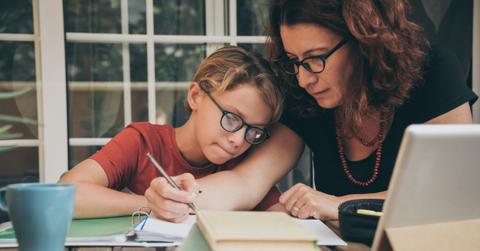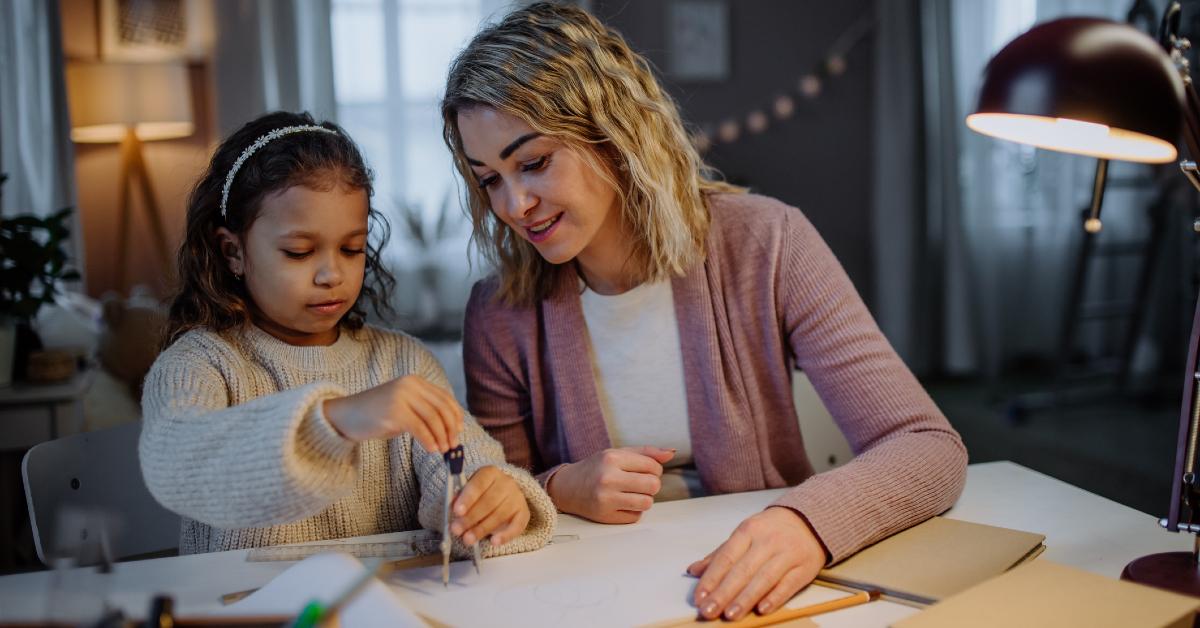Unschooling vs. Homeschooling: Unpacking America's Contentious Alternative Educational Methods
Unschooling is “a method in which there is no imposed curriculum on the child," Boston College professor of psychology Peter Gray told 'Rolling Stone.'
Updated June 26 2024, 3:36 p.m. ET

While most of us have horrific school memories involving lunch shaming, playground fights, cliques, and outlandish rumors, a portion of the population had wildly different experiences. This group saw the same individual as their teacher, principal, nurse, secretary, cafeteria assistant, and even classmate: Mom.
According to the National Home Education Research Institute, approximately 2.5 million U.S. students were homeschooled in spring 2019. As per an April 2024 Forbes article, it's estimated that close to 4 million students are being homeschooled in the U.S. Of course, this leap has much to do with the impacts of the COVID-19 pandemic.
In recent years, there's been an uptick in a form of alternative schooling that puts the power in the hands of the ... kids? Known as "unschooling," this controversial schooling method has haters. While these "anti-unschoolers" are primarily fueled by their wish for America's children to get the educations they deserve, is this justified?
We're here to unpack this touchy topic like a soggy PB&J sandwich during lunch period.

What is homeschooling?
According to the NYC Public Schools website, "homeschooling is independent, parent-directed, and parent-funded education." Furthermore, this alternative at-home education leaves room for customization, as parents have a say in choosing subjects, the curriculum, the schedule, and the teaching style.
Though homeschooling is legal in all 50 U.S. states, each state has different legalities concerning public school withdrawal, records, curriculum, et cetera.
As detailed by the Coalition for Responsible Home Education, the modern homeschooling movement took off in the 1970s when American teacher-turned-school reform advocate John Holt criticized traditional schooling's rote learning system and "oppressive" conditions.
In his book How Children Fail, Holt argued that compulsory education stifles children from exploring their innate curiosity. Instead, students are overcome by their trained desire to follow the teacher's orders, aka obey authority. (The fear of getting in trouble sucks the fun out of learning.)
Holt's educational theorist pal, Dr. Raymond Moore, believed early schooling was problematic and that kids should be homeschooled until eight or nine years old.
Dr. Moore, a Seventh Day Adventist who believed in combining the Bible's teachings with statistical data on children's learning processes, was not religious enough for the evangelical and fundamentalist Christians who essentially took over the movement during the '80s and '90s. They deemed the nation's public schools “Satanic hothouses," as mentioned by the CRHE.
The final nail in the coffin of the progressive homeschooling boom was the emergence of conservative Christian lawyer Michael Farris, who maintained that the public school system was indoctrinating children with secular bologna that removed God from the equation, as per The Washington Post.
The '70s wave saw people stand up on behalf of children, with a motive to liberate them. By the '90s, motives for homeschooling were widely — but not always — connected to radical Christian and Right-leaning beliefs, as organizations seemingly fought to let parents force-feed their children conservative ideologies.
Today, homeschooling families choose this route for various reasons: The child has special needs, the child has mental and/or physical health issues, close-knit family life is a priority, discontentment with the local school system and its academic offerings/approach, concern with the traditional school environment (e.g. bullying, damaging peer pressure, distractions), et cetera.
What is unschooling?
In June 2024, a TikTok by creator Mami Onami took Twitter (now X) by storm. As of this writing, the tweet has been viewed over 24.4 million times. The spiritual thinker discussed unschooling or "free schooling" her children.
"We don't teach our children anything. Everything that they learn is in response to either their interest or their questions," she says in the video. "We have no curriculum, we have no school hours; we really just respond whenever they wanna know something and do our best to make sure they really get it."
When it comes to children showing interest in topics like reading and math, Mami Onami believes "it will come at the right time."
Outraged Twitter users spoke up, many of them fearing for her children's futures and some calling her teaching methods "abusive."
Coined by John Holt, unschooling is a form of homeschooling. According to Peter Gray, a Boston College professor of psychology and a founding member of the Alliance for Self-Directed Education, unschooling or “self-directed learning" is “a method in which there is no imposed curriculum on the child," he told Rolling Stone. "It’s based on the idea that children naturally learn what they are naturally curious about.”
It's estimated that between 10 and 20 percent of U.S. homeschoolers qualify as "unschoolers."
Rolling Stone highlights that some research shows unschooled children underperform on academic tests, especially in areas like reading. Additionally, research suggests children with developmental disabilities may struggle in an unstructured academic environment. Gray has witnessed certain children on the spectrum soar in a self-directed learning setup, however.
Free democratic schools are another alternative, as they value “education in which young people have the freedom to organize their daily activities, and in which there is equality and democratic decision-making among young people and adults," as per the AERO Directory of Democratic Education.
Overall, the United States gives parents and guardians the freedom of academic choice. But remember, we also have freedom of speech, and opinionated citizens aren't afraid to use it in a TikTok comment section.